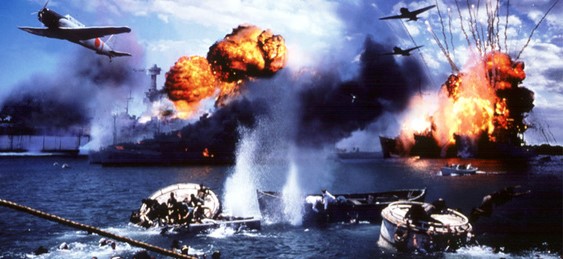The Attack on Pearl Harbor : Overview & Analysis

Events Leading Up to the Attack on Pearl Harbor
The events leading up to the attack on Pearl Harbor were complex and multi-faceted, deeply rooted in the political and military tensions of the time. During the 1930s, Japan, seeking to become a dominant power in the Pacific, embarked on an aggressive expansionist policy, invading parts of China and Southeast Asia. This expansion increased tensions with the United States, which opposed Japan’s imperialistic ambitions. The U.S. responded with economic sanctions, including an oil embargo, severely impacting Japan’s war effort and economy. These actions, coupled with failed diplomatic negotiations, pushed Japan towards planning a surprise attack against the U.S., aiming to cripple its Pacific Fleet and gain the upper hand in the Pacific region.
The Attack on Pearl Harbor: December 7, 1941
Attack on Pearl Harbor On December 7, 1941, Japan launched a surprise military strike against the U.S. naval base at Pearl Harbor, Hawaii. This attack was meticulously planned and executed with the intent of destroying the U.S. Pacific Fleet, thereby preventing it from interfering with Japanese military operations in Southeast Asia. The attack commenced early in the morning and involved hundreds of Japanese fighter planes. They successfully damaged or destroyed numerous U.S. naval vessels, including battleships and destroyers, and killed over 2,400 American service members and civilians. This event marked a significant turning point in World War II, leading directly to the United States’ entry into the war.
The Impact of the Attack on Pearl Harbor
The attack on Pearl Harbor had immediate and far-reaching impacts. Most directly, it resulted in significant loss of life and destruction of military assets. The episode also had profound strategic implications, as it temporarily crippled the U.S. Pacific Fleet, giving Japan a temporary advantage in the Pacific.
However, the attack galvanized American public opinion, transforming isolationist sentiment into a unified call to arms. It also increased military production and workforce enlistment in the U.S., significantly boosting the Allied powers’ capacity in World War II. Additionally, the attack had repercussions for Japanese Americans, many of whom faced internment and discrimination in the war’s aftermath.
Historical Significance of Pearl Harbor
The historical significance of attack on Pearl Harbor lies in its role as a pivotal moment in World War II. It marked the entry of the United States into the war, a move that would eventually tip the balance in favor of the Allies. The attack demonstrated the effectiveness and impact of aerial warfare, changing military tactics for years to come.
It also highlighted the vulnerabilities of naval bases to air attacks, leading to changes in military strategy and defense preparedness. Furthermore, Pearl Harbor symbolized American resilience and determination, reinforcing national unity and resolve in adversity.
Commemorating attack on Pearl Harbor: Memorials and Museums
Commemorating Pearl Harbor involves honoring those who lost their lives and reflecting on the historical significance of the event. The most prominent memorial is the USS Arizona Memorial at Pearl Harbor, which stands over the sunken remains of the battleship USS Arizona.
This memorial serves as a poignant reminder of the lives lost and a site for reflection and learning. Various museums and exhibits around Pearl Harbor, including the Pacific Aviation Museum and the Battleship Missouri Memorial, offer insights into the events of December 7, 1941, and the broader context of World War II. These sites are crucial in educating the public about the attack and preserving its memory for future generations.
Lessons Learned from Pearl Harbor
The attack on Pearl Harbor taught several critical lessons in military strategy, national security, and international relations. One key lesson was the importance of intelligence gathering and interpretation; the U.S. had indications of a possible Japanese attack but needed to comprehend or act on them entirely.
The event also underscored the need for constant vigilance and preparedness in national defense. On a broader scale, Pearl Harbor illustrated the catastrophic consequences of diplomatic failures and highlighted the interconnectedness of global political actions. These lessons continue to inform military and political strategies to this day.
Pearl Harbor Today: Tourism and Remembrance
Today, Pearl Harbor is not only a site of historical significance but also a popular tourist destination. Visitors from around the world come to pay their respects, learn about the events of December 7, 1941, and understand the broader context of World War II. The site offers guided tours, exhibitions, and educational programs, allowing people to explore the history in an immersive and meaningful way. Tourism at Pearl Harbor plays a vital role in keeping the memory of the attack alive, ensuring that the lessons and experiences of that day continue to resonate with new generations.
Remembering the Victims of Pearl Harbor
Remembering the victims of Pearl Harbor is an essential part of honoring the site’s history. The victims included military personnel and civilians whose lives were abruptly ended or forever changed by the events of that day. Commemorative events, such as memorial services and moment-of-silence observances, are held annually on December 7. These acts of remembrance are crucial for acknowledging the sacrifice and bravery of those who were lost, offering solace to their families, and reminding society of the human cost of war.
Conclusion: Honoring the Memory of Pearl Harbor
In conclusion, attack on Pearl Harbor the memory of Pearl Harbor is a powerful reminder of the impact of war, the importance of preparedness, and the resilience of the human spirit. As we look back on this pivotal moment in history, we honor those who lost their lives and recognize the lasting implications of the attack on global affairs. The legacy of Pearl Harbor transcends generations, serving as a testament to the courage and sacrifice of those involved and a cautionary tale about the consequences of conflict and the value of peace. By remembering Pearl Harbor, we reaffirm our commitment to learning from the past to shape a more secure and harmonious future.






